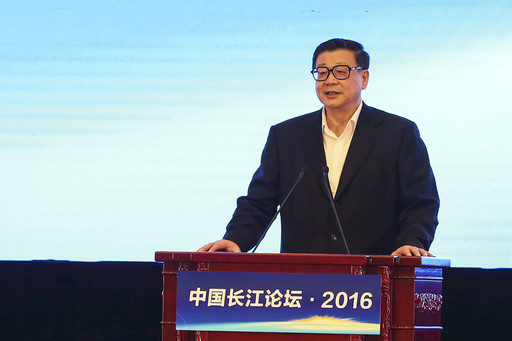Green development prioritized in Yangtze River Economic Belt
Author : Zhang Fan Source : Chinese Social Sciences Today 2016-12-08

Wang Weiguang, president of the Chinese Academy of Social Sciences, delivers a speech at the 2016 China Yangtze Forum held from Nov. 18 to 19 in Wuhan, central China’s Hubei Province. (PHOTO: CSST)
The 2016 China Yangtze Forum, with the theme “Prioritizing Ecology, Achieving Green Development,” was co-hosted by the Chinese Academy of Social Sciences (CASS), the Hubei provincial government and several other ministries of China’s central government from Nov. 18 to 19 in Wuhan, Hubei Province.
Green development is not only closely linked to China’s ecological security and the health of several hundred million people but also an inevitable adjustment in the “new normal” for Chinese economy within the context of the Paris Agreement on climate change and the UN 2030 Agenda for Sustainable Development, said Wang Weiguang, president of CASS.
Yangtze River environmental protection and ecological restoration should be prioritized and the idea of ecological primacy should be asserted, said Jiang Chaoliang, party secretary of CPC Hubei Provincial Committee. The focus should be on extensive protection rather than large-scale development, he added.
Jiang said that the relationship between protection and development needs to be balanced. It is necessary to speed up institutional innovation, including protection, supervision, accountability and compensation mechanisms, to put the idea of protection into practice, he said.
Xiao Jincheng, former director of the Institute of Spatial Planning and Regional Economy at the National Development and Reform Commission, said the size of the ecological zones, the quantity and quality of water sources, and other key elements should be fully considered when establishing an ecological compensation system and assessment system.
Xiao encouraged setting up a more comprehensive ecological compensation mechanism among the Yangtze River and its tributaries, neighboring areas, ecological zones and other related sectors. Moreover, an incentive system directly connecting environmental performance with fund distribution should be improved.
To construct a green ecological corridor in the Yangtze River Economic Belt, Qin Zunwen, vice-president of the Hubei Academy of Social Sciences, put forward strategies including a governance model of “whole reaches” to deal with cross-regional and inter-department protection issues as well as a cross-regional coordination network for better communication among scholars, businesspeople and residents of the region.
Wei Houkai, director of the Rural Development Institute at CASS, said innovation is essential to the coordinated development of the economic belt. The administrative barriers should be broken and cooperation should be strengthened to boost concerted development in riverside regions, Wei added.
It is necessary to explore a cross-regional development mechanism of combining research with production to integrate scientific and technological innovation resources, said Zhang Bo, vice-president of the Chongqing Academy of Social Sciences. Free mobility of innovative elements in the whole basin will transform innovation into the endogenous driving force of green development, Zhang added.
Based on their conditions and features, the provinces along the Yangtze River Belt should adopt a clear orientation and upgrade their industrial distribution to construct a more reasonable, efficient, green and coordinated industrial layout, said Wang Yanxin, president of the China University of Geosciences.
Ye Shengtao made Chinese fairy tales from a wilderness
Ye Shengtao (1894–1988) created the first collection of fairy tales in the history of Chinese children’s literature...
-
How northern ethnicities integrated into Chinese nation
2023-09-18
-
Mogao caves
2023-09-12
-
Mogao Grottoes as ‘a place of pilgrimage’
2023-09-12
-
Time-honored architectural traditions in China
2023-08-29
-
Disentangling the civilizational evolution of China
2023-08-28
-
AI ethics in science fiction
2023-08-23














 2011-2013 by www.cssn.cn. All Rights Reserved
2011-2013 by www.cssn.cn. All Rights Reserved